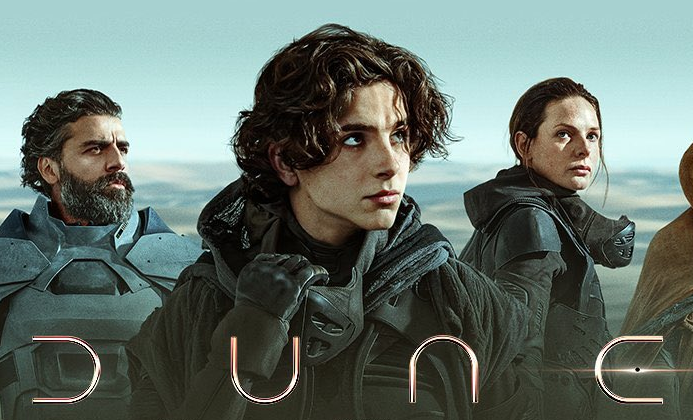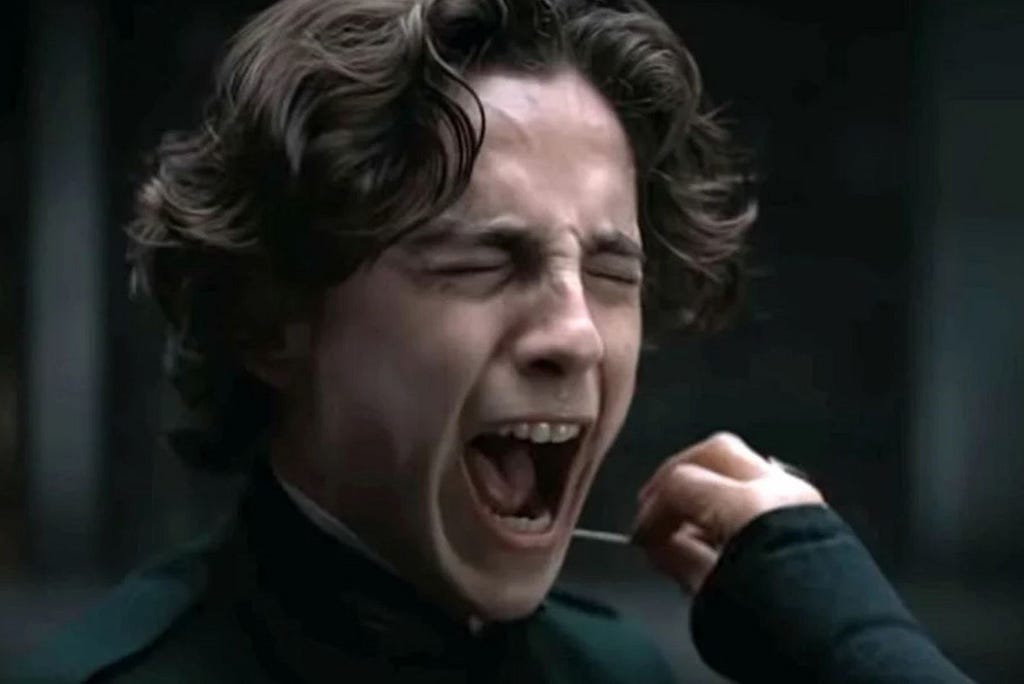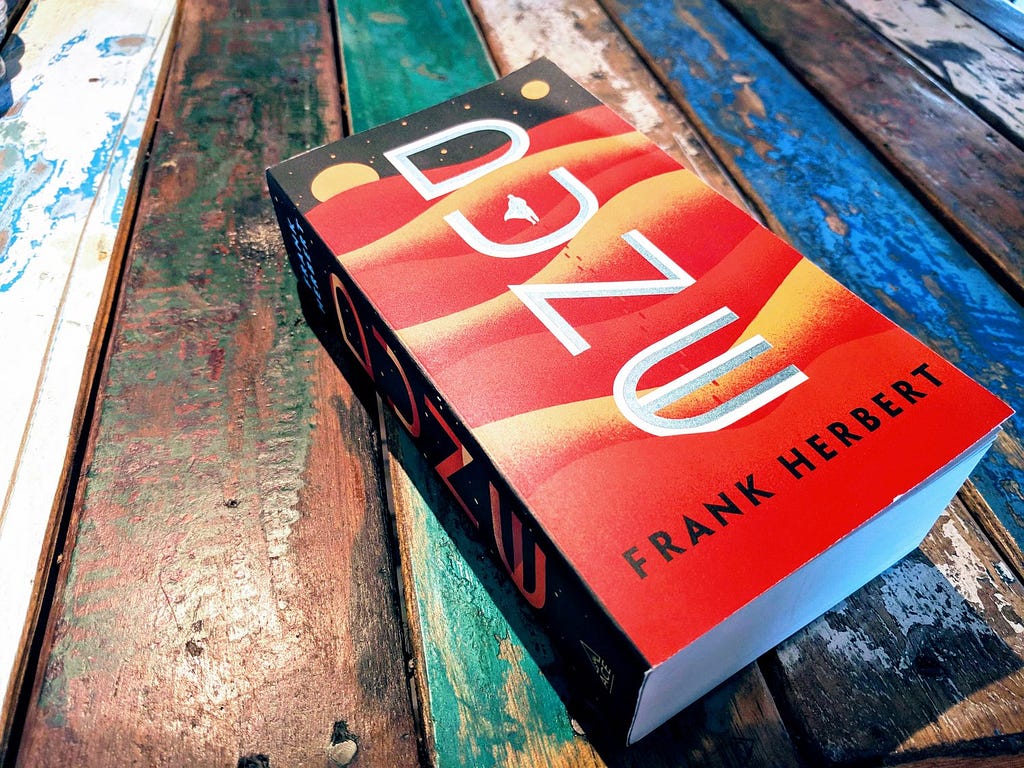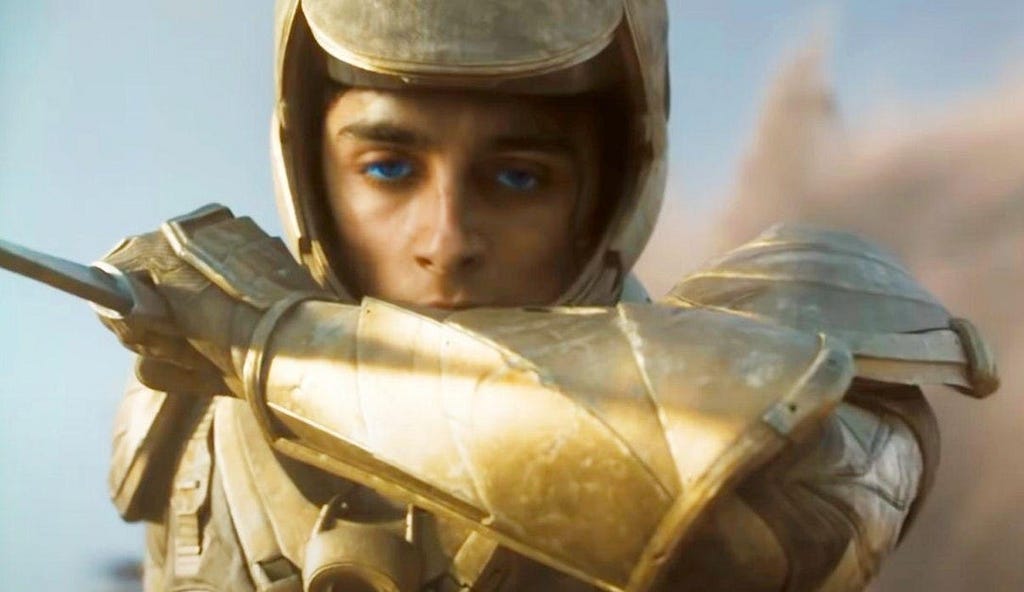
Dune Movie vs. Book: The key story element missing from the movie, and why the book is far superior in terms of storytelling Photo by Warner Bros.
Photo by Warner Bros.
I was quite stunned after watching this movie. Stunned both in the best sense — by its visual grandeur, immersive world-building, and top-notch acting — and in the worst sense, by what director Denis Villeneuve got so shockingly wrong with his adaptation.
I was first drawn into the world of Dune through the casting of Oscar Isaac and Rebecca Ferguson, who are two of my favorite actors. So I was familiar with the overall story of Dune before watching the movie. The experience of being transported to this futuristic desert planet that had only existed in my mind felt magical.
Because I loved this world of Dune so much, it took me several days to come off my fangirling high, and figure out what was wrong with this movie.
Why am I not going back to re-watch the entire movie, but only selected scenes? Why do I feel this movie left such gaping holes in its story, that’s driving me to read the book instead?
SPOILERS below for the movie (not the book).
Only after devouring the first half of the book that the movie was based on, did the problem become clear. The movie left out the key element that made the book so exciting to read: the central conflict between the Atreides and Harkonnens.
What is the central conflict of Dune?
Think about the movie for a second. What central conflict does it introduce in its first Act (before they arrive on Arrakis)? No cheating if you’re a book reader!
It’s fuzzy at best, and completely unclear at worst, especially for new viewers.
I recall only three scenes in Act 1 that sets up the central conflict:
Act 1 scenes:Leto tells Paul: “we’ll face political danger” on ArrakisGurney tells Paul after they train: “The Harkonnens are not human, they’re brutal!”Rabban screams to Baron Harkonnen: “How can the Emperor take everything we’ve built, and give it to that Duke?!”
Okay, so the Harkonnens are clearly mad that the Atreides “stole” Arrakis away from them. But there’s only a veiled threat of this being a “gift”, with no real action being planned.
Meanwhile, the Atreides are clearly aware of the danger that the Harkonnens pose. Their plan is to ally with the Fremen to make their House stronger. We don’t ever see this “Emperor” that’s mentioned, so he’s quickly forgotten.
Alright, pop quiz! Based on these three scenes, how would you summarize the central conflict in one sentence?
I know what the movie wants me to say: Can the Atreides survive an attack from the Harkonnens on Arrakis?
But this is far from being clear. Those three scenes trying to tell me of the Harkonnen danger only span roughly four minutes. The first Act clocks a total of 34 minutes. So barely 12% of Act 1 is used to tell us the central conflict of the story.
Meanwhile, what are they showing us, visually? Leto accepting Arrakis in a grand ceremony, with no objections or concerns from anyone else on whether that’s a good idea. Paul seeing visions of a Fremen girl. Paul wanting to go to Arrakis with Duncan. Paul facing the gom jabbar test from the Reverend Mother, and learning that he may or may not be the Kwisatz Haderach.
Do any of those things that are being shown to us, have anything to do with the central conflict of Atreides vs. Harkonnens? Nope!
So if we’re being shown 25+ minutes of other things, and only being told 4 minutes of the true dilemma this movie supposedly revolves around, how can you blame anyone new to this world to have any idea what the real conflict is?
In fact, based on what we’re shown in Act 1 (rather than what we’re told), I would’ve guessed the film’s central conflict is:
Can the Atreides ally with the Fremen on Arrakis?
No wonder so many are calling the Dune movie “boring” and the storytelling “inert”. Because of how vaguely Act 1 sets up the central conflict, this movie was boring. The weaker the conflict, the less interesting the story becomes. It doesn’t help that the goals of Leto, Jessica and Paul were also murky.
Conflict is the KEY to storytelling Photo by Warner Bros.
Photo by Warner Bros.
As a writer, conflict is your best weapon.
The bigger the conflict, and the higher the stakes — the better the story. You need conflict at all levels — from the overarching premise that will run like an earthquake vein throughout your narrative, to the main character relationships, right down to each individual scene.
If built up correctly, your audience will be feverishly turning pages or watching on the edge of their seats, transfixed by this impossible dilemma you’ve presented them, and how it will be resolved.
Here’s a few examples from other sci-fi classics to see how clearly their central conflicts are set up in Act 1.
Examples:The Martian — can a stranded Matt Damon find his way back to Earth?Jurassic Park — can dinosaurs co-exist with humans?The Matrix — can Neo fight back against the Matrix to free humanity?
Aren’t those films’ central conflicts crystal clear? You literally couldn’t miss them, because those films devote nearly all of their Act 1 towards setting up these conflicts. Their stories, as a result, are far more compelling than Dune’s.
So what went wrong here? Is the source material to blame?
Movie vs Book: Central conflict Photo by Jim Wilbourne
Photo by Jim Wilbourne
After the movie pretty much forced me to go read the novel, I was delighted to find a far more engrossing and fulfilling story on the page! In fact, the book spells out its central conflict — clear as day — within the first three chapters.
The first half of the book alternates between several characters’ POV, mostly focusing on Leto and Jessica. Both of their fear and anger over the Harkonnen death trap on Arrakis practically leap off the pages. To top it off, Chapter 2 is devoted entirely to the Harkonnens, who lay out their exact plan for destroying their hated enemies the Atreides.
Based on these first three chapters, the book’s central conflict is:
Can the Atreides survive a Harkonnen attack on Arrakis?
Now THAT is a worthy conflict for me to keep the turning the pages to gobble up this story!
Villeneuve could not have missed this. He made a conscientious decision to throw out the entire spine of the novel in his adaptation. The question is: why?
Movie vs Book: Key difference Photo by Warner Bros.
Photo by Warner Bros.
Because Villeneuve chose to focus on an entirely different character than the book.
The first half of the book focuses mostly on Leto and Jessica, and far less on Paul. This allows the reader into Leto and Jessica’s minds to see what they’re thinking, and understand how much they are dreading and planning for the Harkonnen death trap they are knowingly walking into. This makes the central conflict very clear.
The movie, however, focuses on a different character: Paul.
It shows us far less of Leto, and also less of Jessica. Instead, the first Atreides we meet is Paul. Villeneuve prioritizes showing us Paul’s constant visions (which occurs far less in the book), modifies the sandworm scene to give Paul more to do, and creates a new scene for him being trained by Jessica on the Voice. Hell, even Leto and Jessica’s only real speaking scene revolves around Paul! Meanwhile, the majority of the scenes cut from the film belong to Leto or Jessica.
I understand why Villeneuve chose to focus on Paul. He intends to make a Dune trilogy — which, when taken as a whole, is Paul’s story. It will show his hero’s journey of growing up from a boy, to a man, to a Messiah. Paul is the future of movies #2–3, so Villeneuve wants the audience to start warming up to him right away and follow his character arc.
Yet, because of that choice, it leaves far less room in the story to really focus on, and flesh out, the central conflict of Atreides vs. Harkonnen.
Villeneuve certainly could’ve done it. If he was bold enough to shift the main perspective of the story, he should’ve reshaped the scenes too, by giving Paul a larger role in helping his father suss out the Harkonnen danger. Both Paul and Jessica could’ve questioned if it’s a good idea to accept Arrakis at all, challenging Leto to clearly lay out their goals. Once on Arrakis, Paul could’ve been more active in setting up defenses or befriending the Fremen to ensure his family’s survival.
But by staying so faithfully to the source material, Villeneuve couldn’t change his character focus without drastically watering down the key political clash from the book. This lack of a clear or compelling central conflict is what doomed the movie.
The end result is a film that is visually stunning, yet feels sadly empty deep down where its beating heart should lie. The only way to cure this ache for a better story, is to read the book (affiliate link). Let’s hope Villeneuve will do a better job of adapting Part 2 and beyond.
How would you sum up Dune’s central conflict? Did you find its narrative compelling? Chat with me in the comments!
For more of my movie/TV storytelling tips, check out my Shang-Chi analysis:
SHANG-CHI MOVIE REVIEW: 10 Storytelling Lessons to Improve Your Writing
Dancy Fu is a writer and learning experience designer. She has been analyzing movies, TV shows, novels and screenplays for more than 16 years, collecting storytelling insights to improve her writing and online courses. Want a fun way to learn storytelling? Join my email list!
Why the Dune Movie Felt Boring, but the Book Hooked Me was originally published in The Writing Cooperative on Medium, where people are continuing the conversation by highlighting and responding to this story.
Read more: writingcooperative.com
